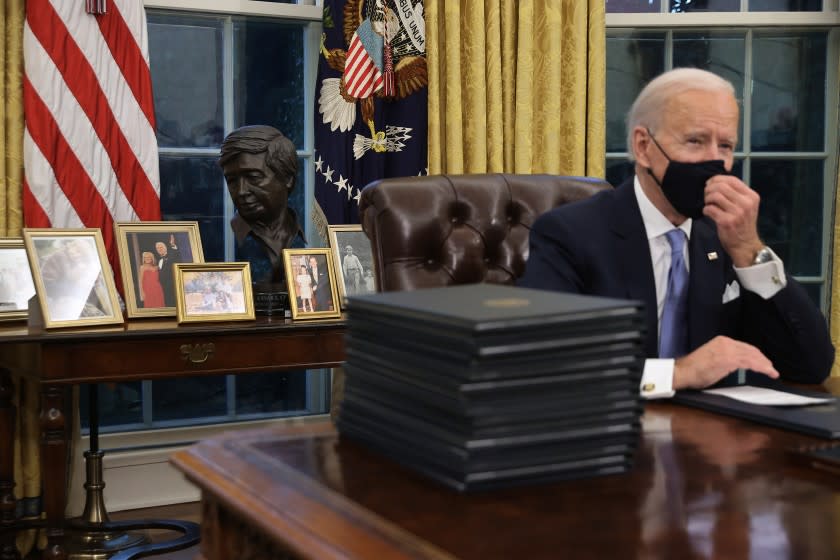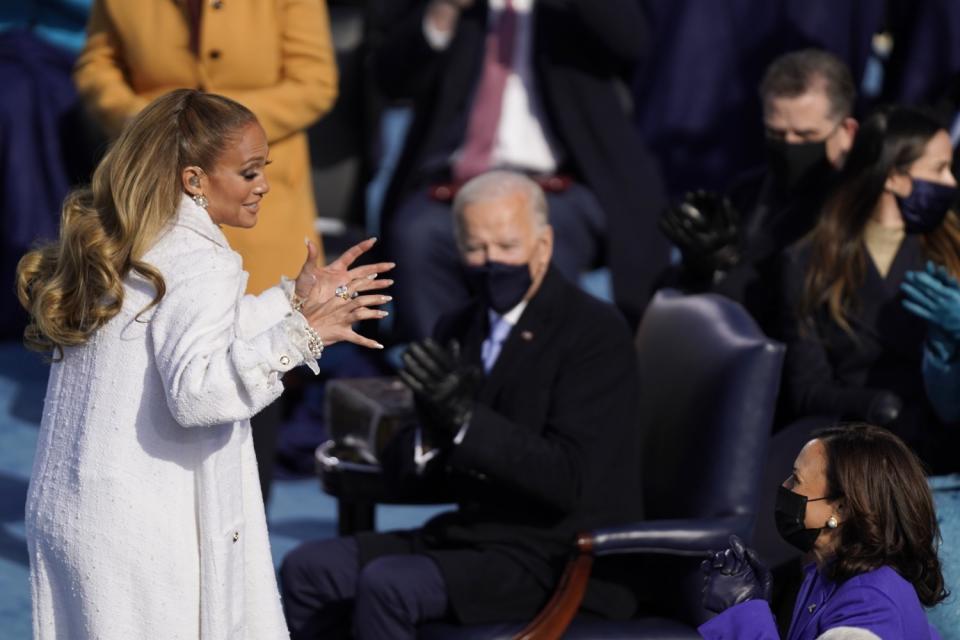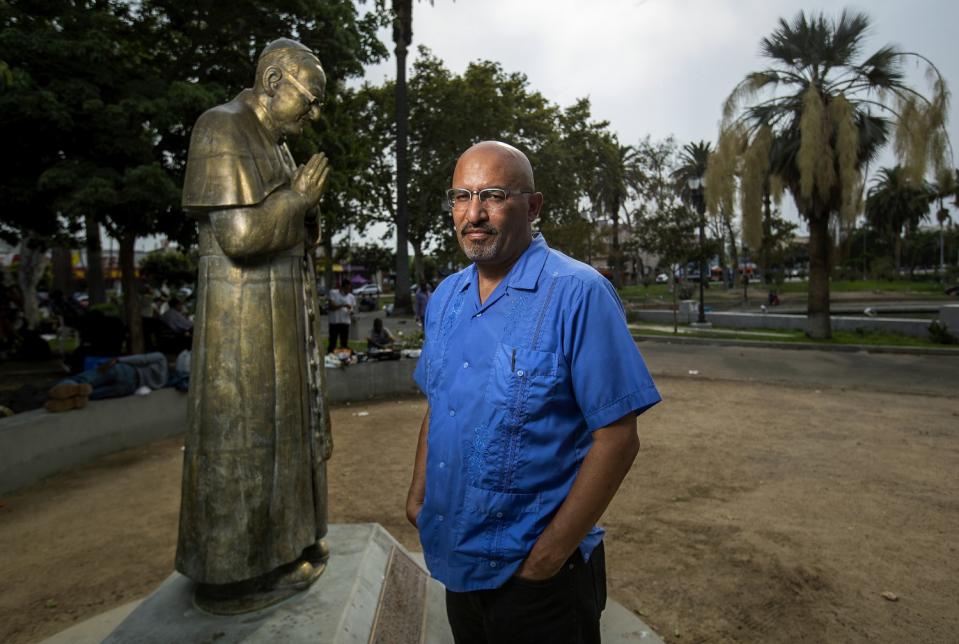Biden has made strong immigration moves. Here's why many Latinos are still skeptical

- Oops!Something went wrong.Please try again later.
It’s a question of days for some of us.
Inauguration Day, Jan. 20, marked 536 days since the El Paso massacre, when a gunman drove more than 650 miles to kill Mexicans. It was 1,683 days after the Pulse nightclub killings. And exactly 2,045 days after Donald Trump launched his campaign for the White House by lambasting Mexico for not sending its “best” people to the United States.
These dates are linked, chronologically and arguably in causation, in the recent cultural history of Latinos in the United States. Their theme is opposition to our existence and, in its worst iteration, eliminating us.
Inauguration Day offered a break in that grim count, with symbolic gestures of Latino visibility at the swearing-in ceremony for President Joe Biden and Vice President Kamala Harris. Jennifer Lopez recited the final line of the Pledge of Allegiance in jubilant Spanish. And Supreme Court Justice Sonia Sotomayor, the high court's first Latina, swore in Harris — the nation's first female, first South Asian and first Black vice president. The new vice president went on to swear in Los Angeles' Alex Padilla to fill her former seat, making him the first Latino U.S. senator from California.

Biden — with a bust of civil rights icon Cesar Chavez looking over his shoulder in the Oval Office — started his presidency by signing a stack of executive actions that radically shifted the tone on immigration. He recommitted the government to DACA, ended the Trump "Muslim ban," halted border wall construction, halted deportations for 100 days and proposed to replace use of the word "alien" to refer to human beings who emigrate here. The new term would be "noncitizen," and the administration is already using it.
Most significantly, the new White House released a fresh immigration reform plan aimed at getting 11 million noncitizens on a pathway to citizenship. President Biden called it the "first thing I'll do."
It was all reassuring. But what immigrants and the country at large just went through was another level of horror, and acutely so for people belonging to any of the marginalized groups abused or attacked by the former president since 2015. Julissa Arce, an activist and author of "Someone Like Me," which details her migration from Mexico at age 11, described a sense of cautious relief that the Trump term is over.
“I think a lot of us are still very traumatized by how things have shaped up,” Arce said. “And I think we have to keep that in mind, and be patient, while they work through it. Versus the conversations we were having before, which were, ‘Can we at least give toothpaste and toothbrushes to kids in cages?’”
Few of these traumas felt adequately processed by what we might call the official discourse during inauguration week.
On the eve of the swearing-in ceremonies, a "Latino inaugural" event featured the now-familiar likes of Eva Longoria, Emilio Estefan and Edward James Olmos; the special was put on by the same folks who brought viewers the "Momento Latino" TV special in October. Longoria, who sometimes speaks inelegantly about her community pride, put it this way: “We’ve seen walls to keep our people out, we’ve seen cages to keep our children in.” But, she went on, “This is our country, nuestra tierra, and we are a key part of the legacy and future of this nation. We’ve always fought an uphill battle, but we’ve never quit.”

Encouraging words, several California Latino writers said in interviews. But wait-and-see is still the mood. After all, Democratic-controlled governments offer a painful track record on reforms that could benefit Latino communities.
During his campaign, President Barack Obama vowed to pass immigration reform in his first term. He said so on July 8, 2008, before the League of United Latin American Citizens. Instead, the Obama administration deported more people than any other in U.S. history, and family separation at the border took off; a groundbreaking study on the topic from Race Forward appeared in 2011, two years into President Obama's term. On the day Biden took his oath and signed those first executive orders, 4,579 days had passed since Obama's promise.
"I'm always cautiously optimistic when it comes to politicians," Arce said. "Many of us have not forgotten the Democrats’ blunders when it comes to immigration, and not just during the Trump administration, when they refused to take a hard line on the DREAM Act, but prior to all that, going all the way back to 2010, when some House Democrats voted against it."
Roberto Lovato, the San Francisco author and journalist whose recent book, “Unforgetting,” highlights the violent effects of U.S. interventionism in Central America, said last week’s festivities will not persuade him to let his guard down.
"Trump has so lowered the bar that people are willing to accept anything as good, like what happened with Bush to Obama," Lovato said. "I mean, we’ve come a long way. It used to be sombreros, remember that? Or 'Si se puede.' But the Democrats are not to be trusted, punto."

As the afterglow of the inaugural shift fades, the realpolitik of domestic and diplomatic pressures has already begun to reemerge. Fox News did its part just before the inauguration with images of migrant "caravans," a familiar throwback that matched its alarmist rhetoric on this triggering topic for conservatives. Former Trump acting Homeland Security Deputy Secretary Ken Cuccinelli went on "Hannity" to call migrants an "absolute human Petri dish opportunity." This came a day after asylum seekers from Honduras were violently repelled at the border with Guatemala, part of the current policy of having secondary states operate as the de facto "wall" of hard-line U.S. policies.
Of course, Republican lawmakers spared no time signaling disapproval of Biden's overhaul of the haphazard immigration system, with Sen. Lindsay Graham saying the most he could see passing was "some kind of DACA deal." And on Tuesday, just six days into the Biden administration, a Trump-appointed federal judge blocked Biden's 100-day deportation ban.
Caught in the middle are the young people who see no other option in their countries but to seek safety in the north, Lovato said. "They're fleeing U.S. foreign policy to be greeted by U.S. immigration policy; this is the most absurdist problem of our times."
The sense of blind hope or dashed expectation is sadly not unique to the Trump years, said Yosimar Reyes, a LGBTQ+ poet and speaker who is also a DACA recipient. Undocumented young people were active in the 2008 Obama campaign, organizing for an election for which they could not cast a vote, he noted.
"Obama won because of the Latino vote. We all believed him. We were out in these streets because he promised he was going to do something in the first 100 days, and I think just the let-down in that was a bit disheartening," Reyes said.
"Yeah, girl, we just lost hope."
He tells others on DACA to remain "cautiously optimistic," as he put it, "for our own mental health."
As of now, his and others' stance is not changing. For millions of de facto Americans like Reyes — who pay taxes, work legally, start businesses — the holding pattern is the same. And for the Biden camp and its promises for the first 100 days, a forward-looking count may now be necessary: maybe the days to go for a passage of comprehensive immigration reform.
Biden-Harris administration, Day 7.
This story originally appeared in Los Angeles Times.

